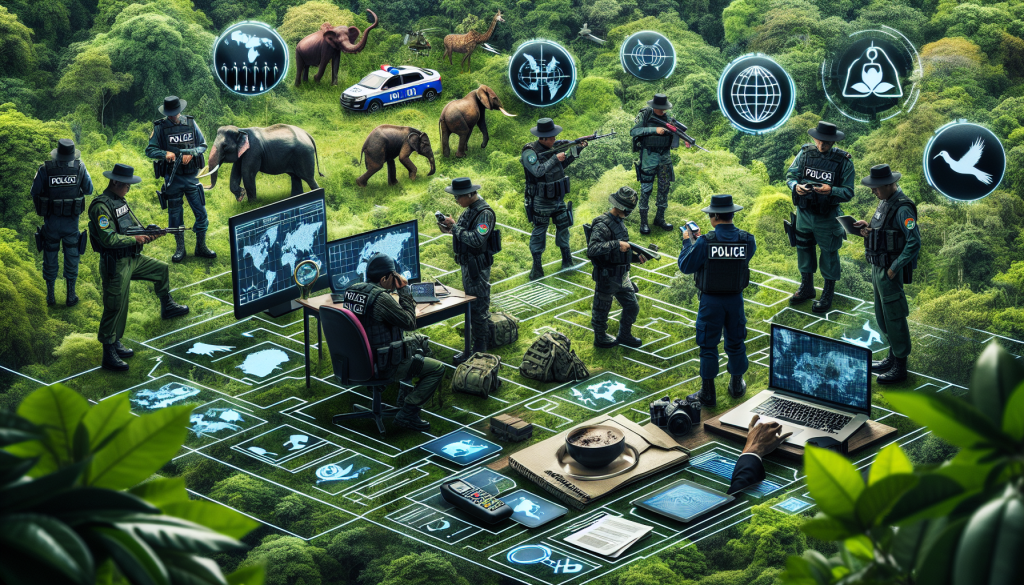Illegal wildlife trade is a pressing global issue, threatening the survival of numerous species and undermining conservation efforts. In order to effectively combat this illegal activity, law enforcement plays a critical role in apprehending wildlife traffickers, confiscating illicit goods, and disrupting the networks that sustain this illicit trade. By upholding the laws and regulations surrounding wildlife protection, law enforcement agencies are at the forefront of safeguarding our planet’s diverse fauna and flora from the detrimental impacts of illegal wildlife trade.

The Scale and Impact of Illegal Wildlife Trade
Illegal wildlife trade is a massive problem that has far-reaching consequences. The scale of this illicit industry is staggering, with the trade estimated to be worth billions of dollars annually. This illegal activity involves the trafficking of various endangered species, including elephants, tigers, rhinos, and many others. The impact of this trade extends beyond just the environmental implications. It poses a threat to global biodiversity, destabilizes ecosystems, fuels corruption, and undermines sustainable development efforts.
Environmental Consequences
The environmental consequences of illegal wildlife trade are profound. Poaching and trafficking of endangered species disrupt natural ecosystems and endanger the balance of our planet’s biodiversity. Many species are hunted to near extinction, leading to irreparable damage to delicate ecosystems. The loss of apex predators, such as tigers and lions, can have cascading effects on entire food webs. Furthermore, the illegal pet trade contributes to the spread of invasive species, which can devastate local fauna and flora.
Threats to Biodiversity
Illegal wildlife trade poses a significant threat to global biodiversity. The demand for exotic pets, traditional medicines, luxury items made from animal parts, and trophies drives the trade. As a result, numerous species are pushed to the brink of extinction. The loss of biodiversity not only disrupts ecosystems but also threatens the delicate balance upon which human survival depends. It is crucial to combat illegal wildlife trade to protect and preserve our planet’s rich biodiversity.
Economic Implications
The economic implications of illegal wildlife trade are vast. This illicit industry drains resources from local communities and undermines sustainable development efforts. It also hinders the potential for eco-tourism, which can provide a viable and sustainable alternative for local economies. Additionally, the loss of wildlife due to poaching can disrupt natural processes, such as pollination and seed dispersal, negatively impacting agricultural productivity. By combating illegal wildlife trade, law enforcement agencies can contribute to the preservation of natural resources and support economic growth through sustainable tourism.

The Role of Law Enforcement Agencies
Law enforcement agencies play a crucial role in combating illegal wildlife trade. Their efforts are essential for disrupting criminal networks, deterring potential traffickers, and raising awareness about the seriousness of this crime. By focusing on various strategies, law enforcement agencies can effectively contribute to combating this global problem.
Investigation and Intelligence Gathering
One of the key roles of law enforcement agencies is to gather intelligence and build cases against wildlife traffickers. By employing various investigative techniques, such as data collection and analysis, undercover operations, and informant networks, law enforcement can identify and apprehend individuals involved in the illicit trade. Collaborating with international agencies also ensures that intelligence is shared and coordinated efforts are carried out effectively.
Interagency Cooperation
Collaboration between different law enforcement agencies is vital in combating illegal wildlife trade. By pooling resources, expertise, and intelligence, agencies can achieve better results in apprehending traffickers and disrupting criminal networks. Partnerships with border control and customs agencies, as well as the establishment of joint task forces and operations, can enhance effectiveness and maximize impact.
Surveillance and Monitoring
Law enforcement agencies employ various surveillance and monitoring techniques to combat illegal wildlife trade. Aerial surveillance, such as using helicopters and airplanes, allows authorities to monitor vast areas for suspicious activities. Maritime patrols help prevent illegal trade through waterways and coastal regions. Additionally, the use of technology, such as drones and satellites, provides valuable insights into the movements of traffickers and helps track their networks. Identification and tracking systems also aid in the identification and documentation of seized wildlife products.
Capacity Building
Investing in training and education programs is vital for building the capacity of law enforcement agencies in combating illegal wildlife trade. Specialized units and expertise focused on this issue can greatly enhance the effectiveness of enforcement efforts. International cooperation and assistance, particularly from organizations like INTERPOL and the World Customs Organization, provide invaluable support in capacity building. Additionally, supporting local communities through providing resources, education, and alternative livelihoods can reduce the incentives for involvement in wildlife trafficking.
Legislation and Policy Enforcement
Law enforcement agencies play a critical role in implementing and enforcing legislation and policies related to illegal wildlife trade. By ensuring that legal frameworks are comprehensive and strong, agencies can provide a solid foundation for combating this crime. Additionally, effective prosecution and adherence to the criminal justice system ensure that offenders are held accountable. Addressing corruption and impunity is also crucial for successful enforcement, as it undermines the effectiveness of laws and allows criminal networks to thrive. Public awareness and education campaigns are essential in mobilizing support and cooperation from the general public.
Challenges Faced by Law Enforcement
Combatting illegal wildlife trade presents several challenges for law enforcement agencies. Understanding and addressing these challenges is crucial for effective enforcement and disruption of criminal networks.
Sophisticated Criminal Networks
Illegal wildlife trade is often driven by highly organized and sophisticated criminal networks. These networks span across multiple countries and continents, making it challenging for a single agency to combat the trade effectively. Cooperation and coordination between law enforcement agencies on a global scale are essential to dismantle these networks.
Limited Resources and Funding
Law enforcement agencies often face resource constraints that hinder their effectiveness in combating illegal wildlife trade. Limited funding, inadequate staff, and outdated equipment hamper their ability to adequately respond to the scale of this problem. Increased investment and allocation of resources are necessary to bolster enforcement efforts and ensure comprehensive action.
Corruption and Bribery
Corruption and bribery pose significant obstacles to the effective enforcement of wildlife protection laws. Traffickers often exploit loopholes and bribe officials to facilitate their illegal activities. Tackling corruption within law enforcement agencies and promoting transparency and accountability are essential steps in combating the trade.
Legal Loopholes and Jurisdictional Issues
Legal loopholes and jurisdictional issues present challenges for law enforcement agencies. The transnational nature of wildlife crime means that offenders can exploit variations in legal systems and jurisdictional boundaries. Strengthening legal frameworks and promoting international cooperation are crucial in addressing these challenges.
Transnational Nature of Wildlife Crime
Illegal wildlife trade is a transnational crime that requires coordinated efforts across borders. Traffickers often exploit weak enforcement in one country to traffic wildlife through another. Building strong international partnerships and sharing intelligence is crucial to disrupt these transnational networks effectively.
Successful Case Studies
There have been several successful case studies highlighting the effectiveness of law enforcement agencies in combating illegal wildlife trade.
Operation Thunderbird
Operation Thunderbird was a joint operation conducted by INTERPOL and the World Customs Organization. This operation targeted illegal wildlife trade across 109 countries and resulted in the seizure of thousands of protected species and the arrest of numerous individuals involved in the trade. This operation demonstrated the power of international collaboration in tackling wildlife crime.
Global Tiger Initiative
The Global Tiger Initiative, led by the International Union for Conservation of Nature (IUCN) and other organizations, aims to double the number of wild tigers by 2022. Law enforcement agencies play a crucial role in supporting this initiative by tackling poaching, trafficking, and other threats to tiger populations.
Project WILDNET
Project WILDNET is an innovative initiative that combines cutting-edge technology, such as artificial intelligence and data analytics, with law enforcement efforts to combat wildlife crime. This project harnesses the power of technology to analyze vast amounts of data, detect patterns, and identify high-risk areas and individuals involved in the illegal wildlife trade.
Operation Cobra II
Operation Cobra II was a joint operation between various law enforcement agencies targeting the illegal trade in reptiles and amphibians. This operation resulted in numerous arrests and the rescue of thousands of animals. It highlighted the importance of interagency cooperation and the use of specialized units to effectively combat specific areas of wildlife trafficking.
Conclusion
Illegal wildlife trade is a global problem that requires a comprehensive and coordinated response from law enforcement agencies. By employing strategies such as investigation and intelligence gathering, interagency cooperation, surveillance and monitoring, capacity building, and legislation enforcement, law enforcement agencies can disrupt criminal networks, protect the environment, and ensure the preservation of biodiversity. While there are challenges to overcome, successful case studies demonstrate the effectiveness of these strategies. By working together and investing in the fight against illegal wildlife trade, law enforcement agencies can make a significant impact in safeguarding our planet’s precious wildlife for future generations.

